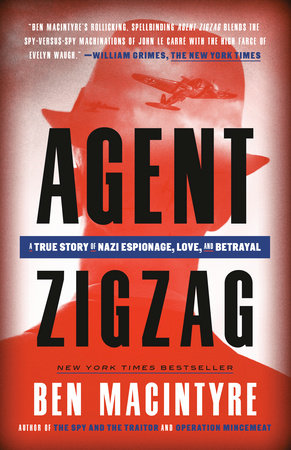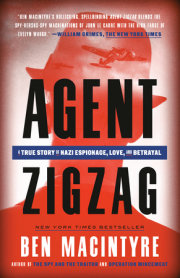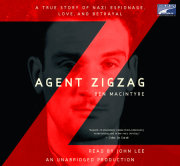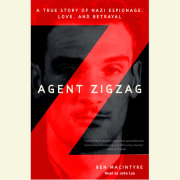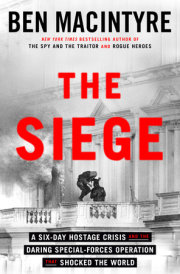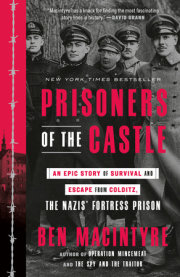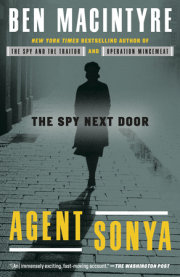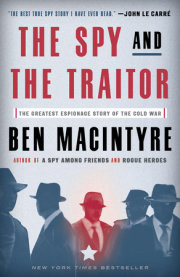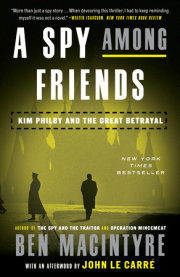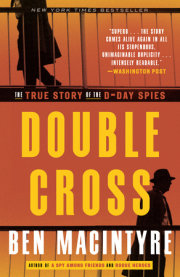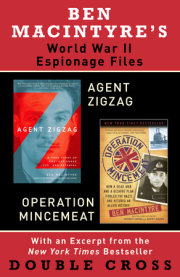CHAPTER ONE
The Hotel de la Plage Spring came early to the island of Jersey in 1939. The sun that poured through the dining-room window of the Hotel de la Plage formed a dazzling halo around the man sitting opposite Betty Farmer with his back to the sea, laughing as he tucked into the six-shilling Sunday Roast Special “with all the trimmings.” Betty, eighteen, a farm girl newly escaped from the Shropshire countryside, knew this man was quite unlike any she had met before.
Beyond that, her knowledge of Eddie Chapman was somewhat limited. She knew that he was twenty-four years old, tall and handsome, with a thin mustache—just like Errol Flynn in The Charge of the Light Brigade—and deep hazel eyes. His voice was strong but high-pitched with a hint of a Northern accent. He was “bubbly,” full of laughter and mischief. She knew he must be rich because he was “in the film business” and drove a Bentley. He wore expensive suits, a gold ring, and a cashmere overcoat with mink collar. Today he wore a natty yellow spotted tie and a sleeveless pullover. They had met at a club in Kensington Church Street, and although at first she had declined his invitation to dance, she soon relented. Eddie had become her first lover, but then he vanished, saying he had urgent business in Scotland. “I shall go,” he told her. “But I shall always come back.”
Good as his word, Eddie had suddenly reappeared at the door of her lodgings, grinning and breathless. “How would you like to go to Jersey, then possibly to the south of France?” he asked. Betty had rushed off to pack.
It was a surprise to discover they would be traveling with company. In the front seat of the waiting Bentley sat two men: the driver a huge, ugly brute with a crumpled face; the other small, thin, and dark. The pair did not seem ideal companions for a romantic holiday. The driver gunned the engine and they set off at thrilling speed through the London streets, screeching into the Croydon airport, parking behind the hangar, just in time to catch the Jersey Airways plane.
That evening, they had checked into the seafront hotel. Eddie told the receptionist they were in Jersey to make a film. They had signed the register as Mr. and Mrs. Farmer of Torquay. After dinner, they moved on to West Park Pavilion, a nightclub on the pier, where they danced, played roulette, and drank some more. For Betty, it had been a day of unprecedented glamour and decadence.
War was coming, everyone said so, but the dining room of the Hotel de la Plage was a place of pure peace that sunny Sunday. Beyond the golden beach, the waves flickered among a scatter of tiny islands, as Eddie and Betty ate trifle off plates with smart blue crests. Eddie was halfway through telling another funny story when he froze. A group of men in overcoats and brown hats had entered the restaurant and one was now in urgent conversation with the headwaiter. Before Betty could speak, Eddie stood up, bent down to kiss her once, and then jumped through the window, which was closed. There was a storm of broken glass, tumbling crockery, screaming women, and shouting waiters. Betty Farmer caught a last glimpse of Eddie Chapman sprinting off down the beach with two overcoated men in pursuit.
• • •
There was much that Betty did not know about Eddie Chapman. He was married. Another woman was pregnant with his child. And he was a crook. Not some halfpenny bag snatcher, but a dedicated professional criminal, a “prince of the underworld,” in his own estimation.
For Chapman, breaking the law was a vocation. In later years, when some sort of motive for his choice of career seemed to be called for, he claimed that the early death of his mother, in the TB ward of a pauper’s hospital, had sent him “off the rails” and turned him against society. Sometimes he blamed the grinding poverty and unemployment in northern England during the Depression for forcing him into a life of crime. But in truth, crime came naturally to him.
Edward Chapman was born in Burnopfield, a tiny village in the Durham coalfields, on November 16, 1914, a few months into the First World War. His father, a marine engineer and too old to fight, had ended up running the Clippership, a dingy pub in Roker, and drinking a large portion of the stock. For Eddie, the eldest of three children, there was no money, not much love, little in the way of guidance, and only a cursory education. He soon developed a talent for misbehavior and a distaste for authority. Intelligent but lazy, insolent and easily bored, the young Chapman skipped school often, preferring to scour the beach for lemonade bottles, redeemable at a penny a piece, and then while away afternoons at the cinema in Sunderland.
At the age of seventeen, after a brief and unsatisfactory stint as an unpaid apprentice at a Sunderland engineering firm, Chapman joined the army, although underage, and enlisted in the Second Battalion of the Coldstream Guards. Early in his training at Caterham, he slipped while playing handball and badly gashed his knee; the resulting scar would provide police with a useful distinguishing feature. The bearskin hat and smart red uniform made the girls gawp and giggle, but he found sentry duty outside the Tower of London tedious, and the city beyond beckoned.
Chapman had worn a guardsman’s uniform for nine months when he was granted six days’ leave. He told the sergeant major that he was going home. Instead, in the company of an older guardsman, he wandered around Soho and the West End, hungrily eyeing the elegant women draped over the arms of men in sharp suits. In a café in Marble Arch, he noticed a pretty, dark-haired girl, and she spotted him. They danced at Smokey Joe’s in Soho. That night he lost his virginity. She persuaded him to stay another night; he stayed for two months, until they had spent all his pay. Chapman may have forgotten about the army, but the army had not forgotten about him. He was sure the dark-haired girl told the police. Chapman was arrested for going absent without leave, placed in the military prison in Aldershot—the “glasshouse” —and made to scrub out bedpans for eighty-four days. Release and a dishonorable discharge brought to an end his first prison sentence, and his last regular job. Chapman took a bus to London with £3 in his pocket, a fraying suit, and a “jail-crop haircut.” He headed straight for Soho.
Soho in the 1930s was a notorious den of vice, and spectacular fun. This was the crossroads of London society, where the rich and feckless met the criminal and reckless, a place of seamy, raucous glamour. Chapman found work as a barman, then as a film extra, earning £3 for “three days doing crowd work”; he worked as a masseur, a dancer, and eventually as an amateur boxer and wrestler. He was a fine wrestler, physically strong, and lithe as a cat, with a “wire and whipcord body.” This was a world of pimps and racecourse touts, pickpockets and con artists; late nights at Smokey Joe’s and early champagne breakfasts at Quaglino’s. “I mixed with all types of tricky people,” Chapman wrote later. “Racecourse crooks, thieves, prostitutes, and the flotsam of the night-life of a great city.” For the young Chapman, life in this seething, seedy enclave was thrilling. But it was also expensive. He acquired a taste for cognac and the gaming tables. Soon he was penniless.
The thievery started in a small way: a forged check here, a snatched suitcase there, a little light burglary. His early crimes were unremarkable, the first faltering steps of an apprentice.
In January 1935, he was caught in the back garden of a house in Mayfair, and fined £10. A month later, he was found guilty of stealing a check and obtaining credit by fraud. This time the court was less lenient, and Chapman was given two months’ hard labor in Wormwood Scrubs. A few weeks after his release, he was back inside, this time in Wandsworth Prison on a three-month sentence for trespassing and attempted housebreaking.
Chapman branched out into crimes of a more lurid nature. Early in 1936, he was found guilty of “behaving in a manner likely to offend the public” in Hyde Park. Exactly how he was likely to have offended the public was not specified, but he was almost certainly discovered in flagrante delicto with a prostitute. He was fined £4 and made to pay a fee of 15 shillings 9 pence to the doctor who examined him for venereal disease. Two weeks later, he was charged with fraud after he tried to evade payment of a hotel bill.
Copyright © 2007 by Ben Macintyre. All rights reserved. No part of this excerpt may be reproduced or reprinted without permission in writing from the publisher.

